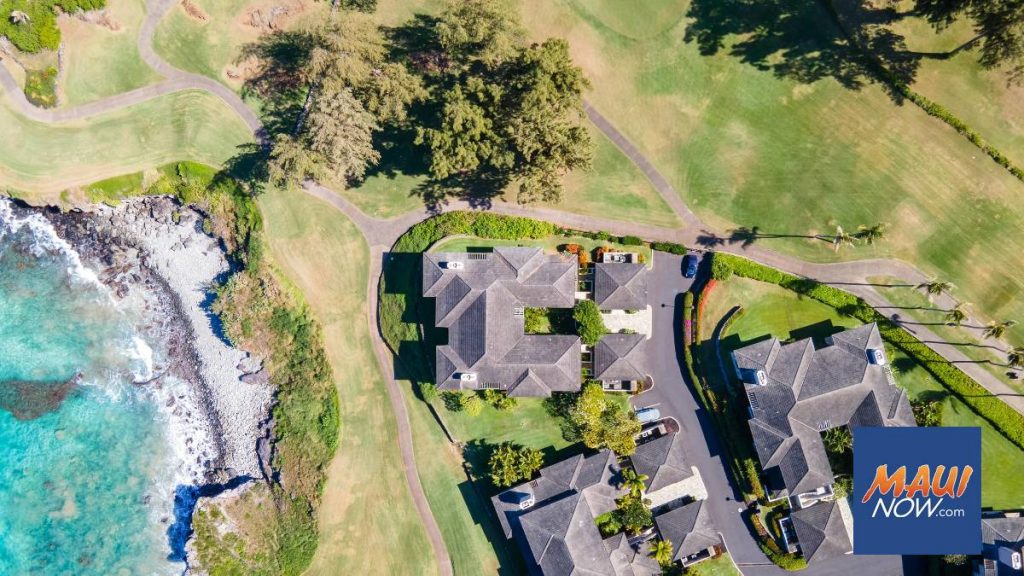Pacaso launches in Maui, but some residents want to pull welcome mat

A new real estate company that helps people own their second luxury home is rolling out a welcome mat in Maui, but some residents are already pushing back, saying the homes are timeshares in disguise that will ruin neighborhoods.
Pacaso announced today via news release that it is expanding to Maui, with its first listing of a $4.9 million home in Kapalua Resorts.
Founded in 2020 by former Zillow executives, the technology-enabled marketplace buys single-family properties under LLCs and then resells it in “fractional” ownerships. Up to four people may co-own a single-family residential home on Maui via Pacaso.
However, Maui County Council Member Tamara Paltin, whose district covers West Maui, said she’s already receiving resident complaints about the company.
During a recent meeting with Pacaso reps, Paltin said she told Pacaso it’s a bad time to come to Maui and the company will not be received well.
“I [was] just letting them know that these Mainland startup Pacaso folks, it’s really bad right here, right now in terms of housing,” she said. “A lot of people are hurting and they don’t care about you and your rich friends and whatever it is you wanna do that you think is gonna be good for the environment or good for the people — they’re hurting.”
Paltin said she is looking into whether the operations are legal. If they are legal, she is researching avenues to make them illegal.
“Instead of one multi-millionaire, now we’re going to have four multi-millionaires,” she said. “Four multi-millionaires for the price of one, that’s not super helpful.”
County Planning Director Michele McLean on Tuesday said that county officials are “definitely concerned.”
“In the past, I have asked Corporation Counsel whether ‘fractional ownership’ is allowed, and have generally been told ‘no,’ ” she said. “But Pacaso has a little bit of a different twist.”
She said council leaders and others are looking into the operation.
Council over the last year has been working on tightening rules on transient accommodations to mitigate negative impacts from over-tourism. Meanwhile, Maui has been buckling under record-high home prices and record-low inventory, coupled with a resurgence of strong visitor counts in a county that only last week lifted COVID-19 restrictions.
Jason Economou, Realtors Association of Maui government affairs director, acknowledged that Pacaso is a hot topic right now. Although he can’t comment on the company specifically, he said, he offered RAM’s position on fractional ownership.
“The Realtors Association of Maui advocates and promotes the preservation of the fundamental right to own, transfer and use real property,” Economou said. “It is not unusual for multiple individuals to own and make use of a single property. Those owners have a right to make lawful use of the property they own. The rights afforded to an individual who owns a property should be equal to those afforded to a group of individuals who own a property. Our laws already acknowledge this basic equitable concept.”
Community organizer Tiare Lawrence, who is from Lahaina, said she is leading an effort via social media site Kākoʻo Haleakalā to stop Pacaso from infiltrating the community. Kākoʻo Haleakalā alleges that Pacaso will ruin neighborhoods by turning homes into virtual hotels that don’t have to pay transient accommodations tax.
“This is the next wave of feeling pushed out because it’ll make it easier for real estate investors to come in and buy luxury real estate at a fraction of the cost,” Lawrence said.
However, Pacaso spokeswoman Chrissy Bruchey said the TAT is a tax for rentals and Pacaso homes are not rentals.
“Pacaso prohibits Pacaso homeowners from renting their home, short-term and long-term rentals are not allowed, only owners and their guests are allowed to occupy a Pacaso home,” she said. “Homeowners of Pacaso homes pay property tax on Maui. On Maui, Pacaso allows up to four owners to become homeowners of a home via co-ownership.”
Lawrence said demand will intensify on an island that already has extremely low inventory and the investments raise the risk of increased property taxes. The affordable housing crisis will only get worse with Pacaso, she added.
Bruchey, though, said that Pacaso is helping reduce waste and preserve affordable housing.
“We were founded on the belief that second homeownership across the world has been wasteful (homes stay vacant for 10 months out of the year),” she told Maui Now. “So we aimed to fix that: more people owning in fewer homes. This is particularly important since there’s a housing affordability crisis in many places, and as we were told by our consultants and many local officials, Maui is no different. By finding people to co-own the same home, we can get them in a higher price point home rather than a home that’s much closer to the median housing price (which is scarce and should be available to people who live in Maui year round).”
“Pacaso also helps preserve affordable housing by only acquiring luxury homes, with a commitment to only purchase homes that are four times the median home value on Maui, leaving more affordable and median priced homes available to others within the community,” she added.
Palm Springs, Sonoma and Salt Lake City governments in California have launched efforts to halt Pacaso in their neighborhoods over timeshare operation claims, according to news reports. Also, a grassroots group StopPacasoNow created a website for pushing Pacaso and its “vacation home” business model out of neighborhoods.
Lawrence encouraged residents to follow Kākoʻo Haleakalā on Facebook or Instagram where she will be adding information about Pacaso.
“I’ve reached out to some of the organizers in California who are pursuing legislation against Pacaso,” she said. “I’m going to continue working closely with organizations that are currently fighting back across the nation.”









